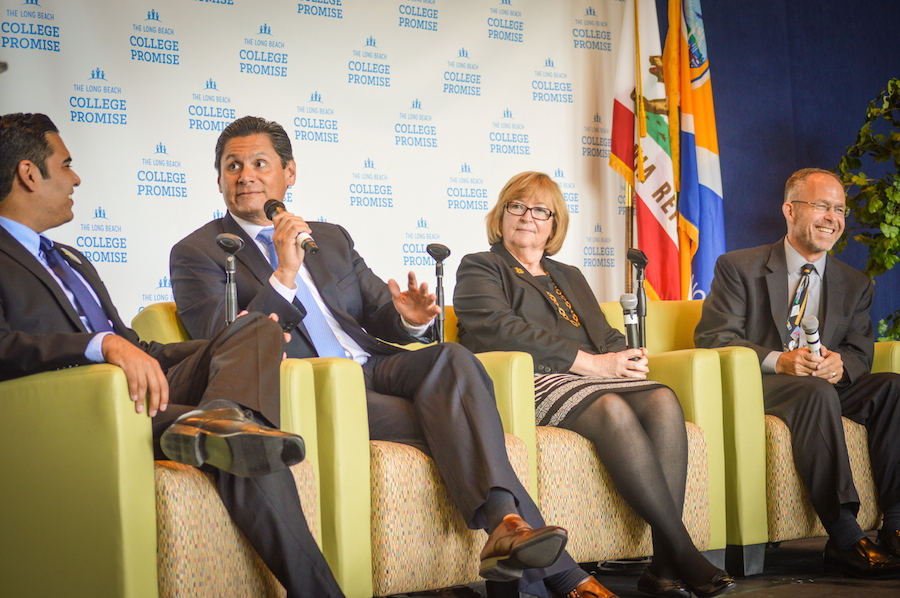
From Left: Mayor Robert Garcia, California Community Colleges Chancellor Eloy Oakley, CSULB President Jane Close Conoley and LBUSD Superintendent Chris Steinhauser at Garcia’s first policy address in 2014. Photo: Jason Ruiz
When Governor Jerry Brown unveiled the latest state budget Tuesday there were plenty of critics of the $122.5 billion figure that was laid out, but maybe one of the hardest hit areas in this year’s finances was education, and educators up and down the state made their voices heard.
Over half of the state’s general fund expenditures will go to K-12 and higher education, but not at the clip that was expected or requested. Both saw modest increases from last year’s spending, with K-12 getting a modest 3.1 percent bump and higher education getting a smaller increase of 0.7 percent.
Those increases, while small, are much better than the 58 percent decrease in funding sustained by the government operations budget and/or the 31 percent decrease absorbed by the state’s workforce and labor development funds.
The steep decreases in some sectors of the budget and modest gains in education were all part of a general contraction of the state’s finances as Brown revealed the first projected deficit for California since 2012-2013.
“This year’s budget will be the most difficult that we have faced since 2012,” Brown said with the release of this year’s budget. “The surging tide of revenue increases that we enjoyed the past few years appears to have turned. Instead, we now face a deficit of $2 billion.”
Brown noted that the $2 billion shortfall paled in comparison to the nearly $30 billion hole the state faced in 2011, but said that without legislators’ attention, this small sum could quickly grow out of control.
The California State University (CSU), of which Cal State Long Beach is the flagship school and one of the most applied to universities in the nation, had asked for a $343.7 million increase for this year’s fiscal year but received a bump of $185 million instead. Community colleges are set to receive $121 million more than last year, according to this year’s budget.
CSU Chancellor Timothy P. White said the extra funding would help address some of the institution’s priorities in the coming years. White added that the CSU would stay committed to its goal of closing the achievement gap and helping the state’s projected shortfall of college educated residents by the end of the decade, a figure that’s estimated to be about one million.
“While student completion has reached all-time highs and continues to increase, we will review all options to ensure that we are able to maintain that momentum,” White said in a statement.
Long Beach State President Jane Close Conoley took a more critical stance on the governor’s budget proposal for the CSU, stating that the budget gap of what it requested and what Brown unveiled Tuesday—roughly $167.7 million—would make it hard to meet that one million graduate goal by 2025. She stated that she’s hopeful that over the next five months, in which negotiations to augment the figures released Tuesday will take place, that legislators will increase funding to the CSU.
“While the increase is greatly appreciated, the governor’s funding commitment hinders Long Beach State University’s ability to increase student access and accelerate graduation rates,” Conoley said. “It’s my hope state lawmakers will consider augmenting his budget proposal to allow us to offer more courses, hire more faculty and invest more in services provided to students to make these improvements. Otherwise, research shows that California’s economic and social well being will suffer for decades to come.”
While K-12 education fared better, California Assemblyman Patrick O’Donnell said that there’s work left to be done. He focused specifically on Proposition 98, a law passed in 1988 that required a minimum percentage of the state’s budget to be spent on K-12 education.
The prop guaranteed annual increases with variables based on the state’s overall growth. In strong economic years, Prop 98 would’ve called for a matching of the previous year’s expenditures on K-12 plus per capita growth and an adjustment for student enrollment.
In years like this year with a projected deficit, Prop 98 requires a matching of the previous year’s funds plus the enrollment growth adjustment, changes in per capita general fund revenue and a half percent increase in state general funds.
O’Donnell said that Prop 98 should be the floor, not the ceiling for K-12, adding that California students should not shoulder the state’s fiscal restraint or have it come at a cost of their education.
“As a father of two school-age children, a teacher, and Chair of the Assembly Education Committee, I firmly believe our state’s first commitment must be to our children,” O’Donnell said in a statement. “This means fostering creative learning environments that encourage students to remain in engaged in their studies. Dedicating additional funds for music and arts education is an essential component of this approach, which will keep kids in the classroom and develop a lifelong thirst for knowledge and the arts.”
He called for his legislative colleagues to look at proposed accounting changes to Prop 98 as well as moving forward with a school bond program. O’Donnell denounced a portion of Brown’s budget, that, because of lower than expected funding to higher education, will phase out middle class scholarships for higher education.
In a letter to the legislature the governor hinted that future budgets may get worse depending on what happens at the federal level. One of the biggest factors could be if the United States Congress acts to repeal the Affordable Care Act, something that could cost the state over $800 million in federal funding for state health care systems.
“In all likelihood, the coming years will bring even worse financial news, either from the start of the next inevitable recession r from changes at the federal level,” Brown wrote. “The uncertainty about the future makes acting responsibly now even more important.”

